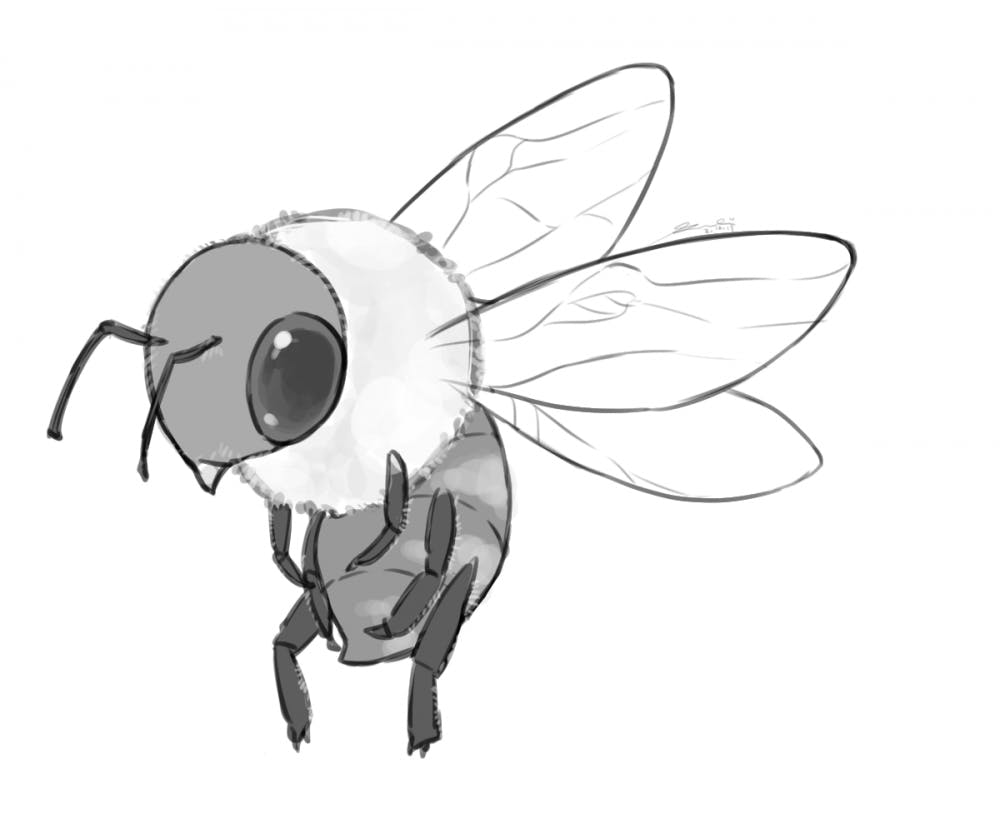Where would you put a beehive?
The top of the Sciences Library? The tunnels under Keeney? How about in one of the old abandoned common spaces across campus that have been turned into boiler rooms?
All of these options were mentioned, in jest, and then dismissed last Friday at the inaugural meeting of the Brown Beekeeping Society in Sayles Hall.
Approved last semester by the Undergraduate Council of Students as a Category I student group, the club plans to run introductory beekeeping courses to train new beekeepers at Brown, said Scott Huson ’21, the “Queen Bee,” or president, of the Brown Beekeeping Society and one of its founders. The group will also partner with the Rhode Island School of Design by borrowing their equipment and using their hives.
Huson also pointed to the opportunity for possible partnership with other organizations in Rhode Island, such as the Rhode Island Beekeepers Association.
The club was initially organized by a group of students brought together by an interest in roof and tunnel hacking. Their inaugural meeting, which drew an audience of around 50 interested students and faculty, highlighted an increase in beekeeping interest not only at the University, but also down the hill at RISD.
“It started off as a joke, but now that everything is falling into place there’s just a lot of promise,” said Aakash Setty ’21, the “Vice Queen Bee” of the club and one of the organizers of last Friday’s event. “We’re all in it for the bees.”
“The bee problem in the world is a very pressing one that hasn’t gotten much exposure because there isn’t much people can do about it,” Huson said. An experienced beekeeper himself, he believes that “getting involved with bees and pollinating insects is (doing) a service to the society.” There was a 40 percent decrease in commercial honey beehives in the United States between 2006 and 2013, according to GreenPeace.
“Having some hives, having some interest and a big group that’s organized, I think we have the potential to be here for a while,” Huson added.
Jack Wrenn, a PhD candidate, delivered the keynote address on “The Challenges of Collegiate Beekeeping.”
While the Brown Beekeeping Society doesn’t have any hives yet, they plan to work with RISD Beekeeping and acquire their own hives next year.
RISD Beekeeping is led by Wynn Geary, a senior majoring in Industrial Design at RISD with a concentration in nature-culture-sustainability. The RISD beekeepers currently operate two apiaries: one on the grounds of the RISD President’s House and another at the Southside Community Land Trust in Providence. They have plans to move their hive at Southside to RISD’s campus this spring, according to Geary.
Geary got involved with beekeeping after he read “Farm City: The Education of an Urban Farmer” by Novella Carpenter in high school. He started his own hive and became a board member of the Philadelphia Beekeepers Guild, and he later founded RISD Beekeeping during his sophomore year of college.
“What an impressive space, what a really great turnout,” Geary said of the event last Friday. “Jack’s presentation was really accurate, … a great synopsis of the history of beekeeping.”
Potential initial hive sites for the Brown Beekeeping Society include the house of President Paxson P’19, emulating the RISD model, or possibly farther from campus in Bristol, where the University owns 372 acres of land.
Audience members were excited about the chance to try their hands at beekeeping on the University’s campus.
Matthew Carlson, a Connecticut resident, stopped by the event while visiting Providence to audition for Brown’s Masters of Fine Arts program. “I’m a huge gardener as well. If bees went extinct, all plants would go extinct too,” he said.
But other members of the audience were less sure of the club’s direction.
“Honestly, I think it’s a little odd,” said Payton Netherland ’22. “I don’t even know if there are going to be hives to be honest.”
The society leaders stressed that no experience was required to get involved with beekeeping and that they were excited to make the group a social experience to complement beekeeping for members.
“Way more people know about the beekeeping society than we thought,” Huson said.
“I’m interested in beekeeping,” Setty said. “I know very little about bees, in fact I’m terrified of bees, but I’m very excited to learn more and meet other people involved with bees too.”
The society aims to continue holding events throughout the semester, with aims to elect leadership and begin organizing trainings soon.





